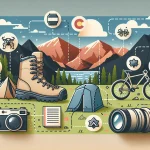If you’re planning to visit this vibrant city within The Centennial State, Colorado Springs safety is something you should consider and prepare for. Known for its natural beauty and abundance of outdoor activities, Colorado Springs is a popular tourist destination that attracts over 6 million visitors per year. However, as with any city, travelers should be aware of potential safety issues to ensure an enjoyable and problem-free vacation. This article provides an in-depth look at Colorado Springs’s safety across key areas – from crime rates and emergency preparedness to health services and community programs – equipping visitors with the knowledge needed to safely navigate the city.
In This Article
TL;DR
- Colorado Springs has below-average crime rates, but some neighborhoods are safer than others.
- Hiking and wildlife safety are paramount – prepare properly and educate yourself.
- Strong emergency and health services are available but plan ahead as a visitor.
- Utilize community safety initiatives and education when possible.
Crime Rate and Safety Perceptions
According to recent statistics, the Colorado Springs area has a below-average crime rate compared to other US cities of a similar size. However, perceptions of safety can vary across different neighborhoods.
The affluent Old North End and Downtown areas tend to be considered very safe with lower criminal activity, while lower-income neighborhoods in the southeast section of the city tend to have higher crime rates like theft. Violent crime has seen an overall downward trend in recent years, but property crime remains an issue to be aware of as a visitor or resident. Having a good home security system is beneficial if you are a Colorado resident. Being alert, avoiding isolated areas at night, and not leaving valuables unattended can help mitigate risks.
Emergency Services and Preparedness
Colorado Springs has strong emergency service departments that regularly coordinate disaster preparedness and response initiatives. The Colorado Springs Police Department consists of over 700 personnel focused on community safety and law enforcement. The Colorado Springs Fire Department operates 23 stations citywide, providing fire protection, emergency medical services, and specialized rescue operations. Visitors should familiarize themselves with emergency numbers and services available in the area in case of illness, injury, fire, or other crisis situations.
Due to its location and climate, Colorado Springs is also vulnerable to certain natural disasters like flash floods, wildfires, thunderstorms, and blizzards. Travelers would be wise to research common weather hazards during their intended travel period and identify emergency shelters or evacuation protocols if necessary. Having emergency supplies and backup plans for disruption of services can also prove invaluable in the event of disasters.
Outdoor and Recreational Safety
One of Colorado Springs’ biggest draws is the abundance of outdoor recreation readily available just outside the city limits. This makes it one of the best places for hiking, climbing, wildlife viewing, and cycling. This makes staying safe while enjoying the natural wonders of the area a top priority.
Safety Tips
Hikers should research intended trails, prepare adequate food/water/navigation tools for length and difficulty, wear proper footwear, be mindful of weather changes, and avoid going alone on high-risk trails whenever possible. Encounters with wildlife like bears, mountain lions, snakes, and spiders are rare, but knowing how to respond and when to seek medical care could save your life.
Hunting is also popular in the fall season, so wearing bright colors when appropriate can increase visibility. When driving mountain roads with sharp turns and steep inclines, go slowly, use extra caution, and remain aware of changing road conditions.
Health and Medical Services
Colorado Springs offers excellent health facilities and medical services to residents and visitors alike. Major hospitals include Penrose Hospital, St. Francis Medical Center, Children’s Hospital Colorado Colorado Springs, and the UCHealth Grandview Hospital. Many specialties are covered across these facilities, including emergency care, trauma treatment, pediatric health, cancer care, heart services, and high-risk pregnancy care.
Traveler’s health insurance plans should be evaluated for nationwide coverage and out-of-pocket costs before arrival. When visiting with children, inquire about pediatric emergency services, family-friendly lodging, and any special safety considerations like childproofing potential hazards.
Transportation and Night Safety
Public transportation in Colorado Springs consists of buses operated by Mountain Metropolitan Transit. Routes cover most key areas of the city with reasonable safety precautions in place like surveillance cameras and emergency alert buttons. However, isolated stops with few fellow ridersshould be avoided at night. Rideshare services also operate across the city and can provide safe transit when needed.
Since Colorado Springs experiences rapid temperature drops after sunset, having warm layers and emergency roadside kits in vehicles when traveling at night or early morning is advised. Avoid walking alone in dimly lit areas and do not engage with intoxicated individuals while downtown late at night. Instead, frequent busier, well-lit streets and request police escorts if feeling threatened.
Community Safety Programs and Education
In order to foster public safety across Colorado Springs, numerous governmental and community initiatives exist, along with events, training courses, and volunteer opportunities. For example, the Community Safety Program offers outreach around crime prevention, while the City Safety Program conducts child car seat checks and helmet fittings.
Events like the Home Safety Fair provide education to residents on fire hazards, cybersecurity, and emergency preparedness. Those passionate about safety can get involved through Citizens Police Academy training, volunteering at safety expos, or joining a Community Emergency Response Team. Aspiring professionals can seek certification courses in fields like cybersecurity or emergency medical response to assist during local crises. Visitors can leverage these great local resources to boost their safety knowledge and connect with community members dedicated to safety.
FAQ
What emergency numbers should I save while visiting Colorado Springs?
Save emergency numbers like 911 along with local police department, fire department, and poison control. Also, identify the nearest hospital, urgent care clinics, and your consulate’s emergency contact.
Where can I access emergency alerts and disaster preparedness tips?
Check sources like the El Paso County Office of Emergency Management website, FEMA’s disaster preparedness guides for Colorado, and local news outlets. Social media accounts for the Colorado Springs Fire Department also provide up-to-date emergency notifications.
What precautions should I take to avoid wildlife encounters when hiking?
Travel in groups, make noise on trails to avoid surprising wildlife, leash pets at all times, and properly store food/trash away from campsites or trailheads. Also learn how to respond safely in wildlife encounters based on the animal and research recent sighting reports.
Are there family-friendly safety programs to utilize while visiting with kids?
Yes, the Colorado Springs Fire Department offers specialized programs on topics like fire safety, emergency preparedness, poison awareness, and more for various age groups. Contact them prior to visiting or check event listings for family safety fairs.
What resources exist if I experience a safety issue like theft or assault during my visit?
Report criminal incidents immediately to emergency services and file a police report for insurance/legal reasons. Colorado Springs police have various programs to aid victims with counseling, court advocacy, compensation assistance, and community referrals.






